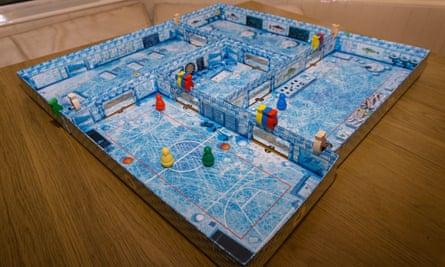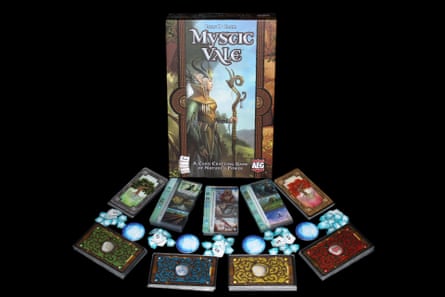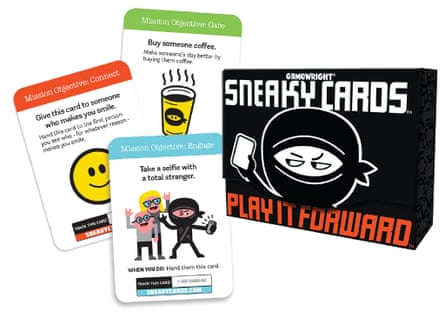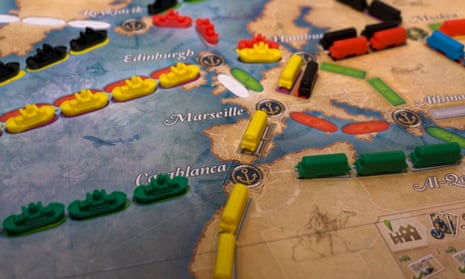Board games have become a big deal in recent years, with growing numbers of players looking for a more sociable alternative to consoles, computers and smartphones. That rising demand has been met by talented designers turning out innovative new games at an incredible rate, but, with thousands of titles hitting the shelves each year, choosing the right ones can be tricky.
That’s why we’re starting a new monthly guide to help you find the best games for you, your friends and family, and to steer clear of disappointing duds. This month we’re frolicking in the Antarctic, battling against dark magic and building global travel empires in the age of steam.
Ice Cool
2-4 players, 20-30 minutes
RRP: £29.99

Anyone who’s ever played Subbuteo will know the simple joy of flicking little plastic men around a table – making masterful shots from improbable angles, hilariously failing to hit a ball that’s mere centimetres away. Ice Cool, from designer Brian Gomez, adopts a similar finger-flicking premise, but substitutes the football pitch for an Antarctic schoolhouse populated by anthropomorphic cartoon penguins.
The game hands you control of a plastic penguin, which you will poke, prod and forcefully project through a series of interconnecting rooms; a 3D environment built from sections of the game box. You will score points by passing through doorways to collect fish, and with the penguin models weighted to allow for dramatic curves and rolls, it’s possible to pull off some impressive trick shots, even launching your figure into the air to leap over walls or rival penguins that get in your way.
Each round also sees one player take on the role of the “catcher”, attempting to score points by colliding with other penguins. The end result feels like a blend of a furious race, a frantic game of tag and a tipsy night around the pool table at the student union. Yes, it’s a bit gimmicky, but if you’re after something quick and silly with huge toy appeal, then Ice Cool is great fun for kids, or for unashamedly immature grown-ups.
Ticket to Ride: Rails and Sails
2-5 players, 90-120 minutes
RRP: £59.99
Family-friendly train game Ticket to Ride is one of board gaming’s great success stories. Since its release in 2004, it’s sold more than 3m copies, and over the years it’s spawned a series of spin-offs allowing players to build rail empires in different locations around the world. Rails and Sails is designer Alan R Moon’s latest take on the game’s popular card-based formula, and it takes things to a new and much grander scale, with players competing on a global map to build worldwide networks of railways and shipping lanes.
If you have played previous games in the series, you will find the core of the game largely unchanged. Players collect cards to claim routes on the board, secretly aiming to connect certain locations on the map to score bonus points. You’ll attempt to find the most efficient routes between cities and to block off the connections your opponents desperately need. The biggest change, though, is that you will need different types of cards to claim land- or sea-based routes. In effect, you’re building two separate networks, and it feels a lot like playing two games of Ticket to Ride simultaneously.
It’s a more mentally taxing take on the original game’s premise, but unfortunately it doesn’t take long for this edition to come off the rails. The requirement to collect different cards means that you can spend several turns fishing for the ones you need before you’re actually able to do anything, and it soon becomes frustrating. Rails and Sails adds length and complexity, but it offers little new in terms of gameplay.
If you’re new to Ticket to Ride, this isn’t the place to jump aboard; you’ll have much more fun with the original game. If you’re already a fan, the existing map pack expansions bring more variety and better value for money. My recommendation: the excellent UK and Ireland expansion.
Mystic Vale
2-4 players, 30 - 45 minutes
RRP: £38.99

Strategy card games such as Magic: The Gathering and Android: Netrunner are a cornerstone of gamer culture. Deep, complex and immersive, they challenge players to build and battle with customised decks, and with thousands of cards to choose from, each with their own strengths, weaknesses and abilities, they offer huge potential for tinkering and tactical experimentation.
Mystic Vale, by designer John D Clair, aims to take this personalisation one step further. It casts players as druids attempting to rid a fantasy world of corrupting dark magic. But the game’s major innovation is its “card-crafting” system, which lets players build entirely new cards as they play.
You will start the game with a set of basic cards housed in see-through plastic sleeves. Throughout the game, you will add new elements to these in the form of transparent overlays that lie on top of your cards and grant them new powers – gaining you points, granting you new abilities or removing pesky corruption from your card pool. It’s a novel spin on the well-worn card game concept, and while experienced gamers will recognise elements from predecessors like Magic, Dominion, Splendor and even the casino mainstay Blackjack, the card-creation system is a new and exciting element.
The game does come with a few flaws, though. There’s little in the way of actual interaction between players, meaning that it can feel as though everyone at the table is immersed in their own individual game. While there are multiple deck-building strategies to choose from, it won’t take long to discover them all. Publisher AEG is planning a series of expansions, though, which should add some variety and replay-ability to what’s already a promising game.
Sneaky Cards
No player limit
RRP: £9.99

More of a social experiment than a game, Sneaky Cards challenges players to complete a series of quirky, off-beat tasks: take a selfie with a stranger, hide a card in a public place, make an impassioned speech in a crowded lift. When you complete a challenge, you will pass the associated card on to someone else, who then has to attempt the task themselves. The result is an ever-growing chain of players, some of whom will have been drawn into the game completely unsuspectingly.
You will register your deck on the publisher’s web site before you play, allowing you to track individual cards as they pass from person to person, and while some – probably the majority – will disappear without a trace, others will run on and on, injecting humour and spontaneity into people’s lives as they go. Some cards even come with an altruistic bent, encouraging players to volunteer for a local organisation or buy someone a coffee, and any game that has the potential to increase my caffeine levels seems like something that ought to be encouraged.
What have you been playing this month? Let us know in the comments below.

Comments (…)
Sign in or create your Guardian account to join the discussion